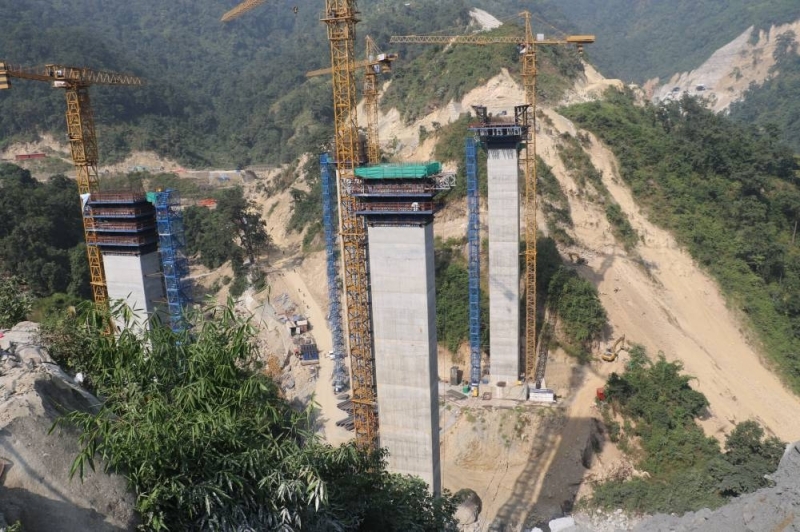Nepal’s Maoist Centre gearing up for elections four years away
Under the party’s Mission-84 campaign, leaders plan to meet in person 2.5 million voters and boost the party’s membership to 800,000.

By Nishan Khatiwada
This Saturday, the ruling CPN (Maoist Centre) is launching its Mission-84 campaign targeting the next parliamentary and provincial elections to be held after four years in 2084 BS. The party on Saturday will launch the special campaign, whose slogan is Janata Sanga Maobadi [Maoists with the public].
The ruling party is all set to kick off the campaign purportedly to bolster its connection with the voters with a motive to improve its electoral prospects.
Party chair and prime minister, Pushpa Kamal Dahal, will announce the commencement of the campaign at 1 pm on Saturday, from Bhattedanda of Chandragiri Municipality.
Speaking at the press meet organised at the party central office in Kathmandu on Friday, party vice chair Agni Prasad Sapkota said, “Internal training sessions will be organised in the first phase, interactions in the second and mass gatherings in the third phase of the campaign.”
The ruling party’s central committee meeting last month had decided to launch a three-month campaign, with a view to improve the organisation’s relations with the general public.
The Maoist Centre will now launch the campaign at all the 6,743 wards across the country, said party leaders. Leaders said they have a plan to meet in person 2.5 million voters under the campaign and disseminate the information about the works done by the present government to ensure good governance, prosperity, and social justice.
“The campaign will last for three months,” said party Standing Committee member Hitraj Pandey.
According to him, after the Maoist Centre rose to mainstream politics through the peace process, it gradually became detached from the working class including farmers and other sections of society at the grassroots. “After we joined mainstream politics, we drew closer to the urban communities. Party leaders discussed it as a serious matter and we realised the need for strengthening our party organisation at the grassroots,” Pandey told the Post.
Party leaders claimed that they aim to increase the party membership to 800,000 by making new members and renewing the membership of inactive members. As per the plan, central office bearers of the party will lead the campaign in provinces, standing committee members and central members in districts and provincial members in local units.
Observers say Maoist Centre’s organisation is currently in shambles.
Some recent reports suggest the party’s voter base has declined markedly—latest election results also hint at the same. In the 2022 general elections, the Maoist Centre bagged the third-largest proportional representation votes—11.1 percent. It was 15.3 percent in 2017. The party had emerged as the largest party after the 2008 Constituent Assembly elections, the first after it joined mainstream politics after the decade-long Maoist insurgency. The party’s House of Representatives seats have also shrunk from 54 to 32 in the 2022 elections.
Political analyst Rajendra Maharjan said, in comparison to the major traditional political parties, the Maoist Centre is “the messiest party, with its organisation in complete disarray, almost defunct and off track.”
As the party revolves around its leader, Maharjan thinks addressing core issues like the leader-centric approach and ineffective organisational structure would only make such campaigns more relevant and effective. “Otherwise such programmes will be merely for show,” he said.
Coalition politics (which appears to be the Maoist party’s primary strategy in recent years) has greatly benefitted Pushpa Kamal Dahal, the incumbent prime minister and chairman of the CPN (Maoist Centre), which has been in continuous decline since emerging as the largest party through the 2008 Constituent Assembly elections. The party has been in almost all the governments formed after it joined mainstream politics in 2006.
In the current government, the party has six ministers and a minister of state, besides the prime minister. Despite a constant decline in all subsequent elections in the past 15 years, the leadership of Dahal, who has been leading the party for the past over four decades, hasn’t been seriously challenged by the party’s second-rung leaders.
“Especially the Maoist Centre, after it entered mainstream politics, it got fully mired in power politics, completely detached from the public’s issues,” said Maharjan. “The party has since then revolved around power games, focussing solely on plum ministries and lucrative government appointments.”
Nishan Khatiwada is a reporter covering national politics for The Kathmandu Post. Before joining the Post, he worked for The Annapurna Express and Nepal Live Today.




